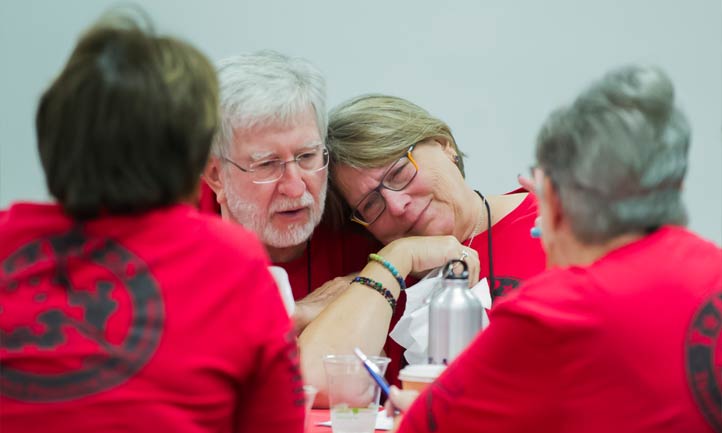Anniversary Blues
Author: Betsy Beard
Handling the most dreaded day of the year
The date is engraved on my heart. The awful day he died. Every year that date comes around again on the calendar, and for lack of anything better, we call it the anniversary of his death. It seems so wrong; anniversaries should be for celebrating a joyous occasion, not for acknowledging a death. But in the six and a half years since Brad’s death, we have never come up with an acceptable alternate name.

He had a birthday, so I suppose we could call it his death day. But I can’t seem to do that; it sounds too raw, too unvarnished. Some call it an angel day and others refer to it as a memory day, personal memorial day, or deployment to heaven. Some people refuse to call it anything at all. No matter what we decide to call it, it hurts.
As the date approaches I feel listless, dreading the date on the calendar that signifies the loss of our family as we knew and loved it. The world presses down on me and I feel lost, distracted, touchy, dysfunctional. More than anything I feel inexpressibly sad.
I think that even if we didn’t have calendars, we would still know that the date was near at hand. Every one of our physical senses can file information in our memory banks, some better than others. So on that bleak day in 2004, even though we felt shattered and numbed by the notification, our senses continued to record and catalog our external surroundings, mingling those memories with our emotional devastation.
Every year since then, tiny seasonal cues work surreptitiously in our brains, letting us know the dreaded day is approaching. The sunlight has a certain slant. The air smells a certain way. The temperature and humidity remind me of this. The leaves and sky looked like that. And once again my heart is heavy.
Those who study death and dying have a name for this phenomenon: anniversary reaction. As we are drawn back in time to the painful memories, the days can feel empty once again and the nights troubled. We might feel anxious for several weeks before the date or for some time afterward (or both).
At any rate, the anniversary reaction is a normal occurrence. We all seem to experience it to some degree. So what can we do to make it through the day? Above all, we can recognize and acknowledge that it can be a difficult time. We can lower our expectations of our capabilities and be gentle with ourselves. We can plan ahead to avoid stressful situations and prepare in advance what to do on that day. Because we all grieve differently, it’s a good idea to discuss the options with other family members. Being flexible to accommodate others’ wishes may be difficult, but helps everyone to feel included. Talking about the day and having a tentative idea of what would work for all involved can alleviate some of the stress and dread.
Think about the coping mechanisms that have worked for you so far and try to incorporate some of them at this harder than usual time. As with other aspects of our grieving journey, trial and error is a valid way of determining what works. Plan to do what you think will help you the most. If it doesn’t bring comfort, try something different next time. And if the day arrives and the plan doesn’t feel right, feel free to change your mind and decide to do something else.
Rather than try to ignore one of the most important people in your life, it can be helpful to focus on the extraordinary lives they lived. Those of us who have endured several anniversary dates have found a number of options for commemorating our loved ones.
Here are some ideas for commemorating our loved ones:
-
Plan a memorial ceremony. The creation of memorial rituals can be part of the ongoing healing process, and these remembrances can take many forms. In the first weeks of loss, rituals helped to carry us through the pain-filled days and brought some meaning and stability to our otherwise chaotic lives.
-
Light a candle in honor of your loved one. In the Jewish tradition it is customary to light a special candle that burns for 24 hours. The candle is lit on the anniversary date of the death, as well as during the initial mourning period immediately following a death.
-
Take a personal day off work to sleep and rest. Grieving is hard work and takes its toll on your mind, body, and spirit. Do what you need to do to care for yourself. You will be better able to function in the future when you take to time to be kind to yourself.
-
Read letters from others about your loved one. Ask friends and family members to write their memories ahead of time and then gather to read them on the anniversary date.
-
Cook your loved one’s favorite meal or special treat and remember how much joy they derived from the time spent together over a favorite dish.
-
Engage in one of your loved one’s favorite activities. It could be watching the latest movie, going bowling, boating, gaming, hiking, or even skydiving.
-
Host a fundraising event for something your loved one cared about. Many survivors plan 5K walks, motorcycle rides, book drives, mission trips, or garden tours.
-
Plant a tree or dedicate a bronze plaque or a flagpole (or all three) in honor of your loved one. This provides a tangible link to your loved one and is visible to the world.
-
Visit and tend to the gravesite. Some survivors bring chairs, food, books, and music and spend the day there. One tradition is to scatter rose petals over the grave. Another is to pour their favorite drink there or “share” it with them.
-
Write a letter to your loved one. Say what was left unsaid, or repeat what needs to be said again—that you love them and that your love is for always.
-
Spend time with others looking through family photographs or watching home movies. Honor the good times you shared.
-
Start a new tradition and do something outside of your normal routine: take a walk, watch the sunrise or sunset, volunteer with an organization that helps others.
Anniversaries, in the broadest sense, are days of acknowledging, honoring, and remembering. And part of dealing with our grief is allowing ourselves to remember. Memory helps us to preserve the bond of love we shared as we continue to live our lives.
Whatever you choose to do or not do, try to include something special that will honor your love and confirm your relationship—a relationship that has changed but has not ended. However you observe the day, be gentle with yourself as you find your way toward dealing with the one day of the year that you will probably never forget.
This article was reprinted from TAPS Magazine Summer 2011, Issue 17, Volume 2.

 By Betsy Beard, Surviving mom of U.S. Army SPC Bradley S. Beard: Betsy Beard served as the editor of TAPS Magazine for seven years in addition to volunteering as a peer mentor, care group facilitator, and national workshop presenter. In that time she authored a number of TAPS publications and Quick Series Guides, as well as the award-winning children's book, Klinger: A Story of Honor and Hope and many articles for TAPS Magazine. Betsy has been published in Living with Loss publications and various newspapers. She currently is a freelance book editor and serves as the awards director of Military Writers Society of America. She lives in North Carolina with her husband, Randy.
By Betsy Beard, Surviving mom of U.S. Army SPC Bradley S. Beard: Betsy Beard served as the editor of TAPS Magazine for seven years in addition to volunteering as a peer mentor, care group facilitator, and national workshop presenter. In that time she authored a number of TAPS publications and Quick Series Guides, as well as the award-winning children's book, Klinger: A Story of Honor and Hope and many articles for TAPS Magazine. Betsy has been published in Living with Loss publications and various newspapers. She currently is a freelance book editor and serves as the awards director of Military Writers Society of America. She lives in North Carolina with her husband, Randy.